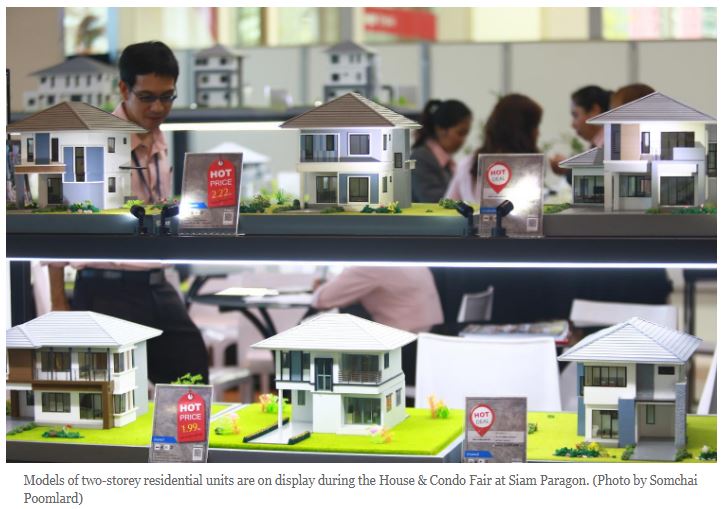Thailand: Listless residential market in 2019
The residential market is likely to fall by 10% this year as the impact of the economic slowdown and loan-to-value (LTV) limits continues into the fourth quarter, say industry analysts.
Atip Bijanonda, honorary president of the Housing Business Association, said there are no positive signs for the sector, though the situation is not as dire as in 1997.
“Banks’ mortgage rejection rates have soared to 40% as the lending rules became stricter after the LTV limits,” he said. “Banks are required to have reserves to cope with a possible slowdown in the economy.”
The Greater Bangkok residential market was worth 372 billion baht in 2018, a rise of 29% from 2017.
Mr Atip said banks are more cautious and stringent because of the economic situation. They have seen signs of layoffs in some sectors.
In the first eight months, the market fell by 5%, with the largest decline registered in the second quarter after the LTV limits took effect on April 1, he said.
Expecting an economic slowdown in the fourth quarter, many developers postponed new projects to next year from the final quarter of 2019.
“Every developer wants to move forward, expand and buy new plots of land for future development,” Mr Atip said. “But they need to make sales and clear existing stock to have funds for new investment.”
Developers should exhaust all tools at their disposal — offer discounts or campaigns to sell as many units as possible, he said. A key problem is the failure to transfer housing units to customers because of mortgage loan rejections.
Next week, three property associations, including the Housing Business Association, the Thai Condominium Association and the Thai Real Estate Association, will send representatives to the finance minister to discuss the property market.
One of the topics will be laws related to the draft of the Land and Buildings Tax Act, which will be implemented next year.
The drafting process should be open for stakeholders to participate in, Mr Atip said.
The other topic will be improvement in regulations related to property, such as construction permits and other licences. The current ones have too many procedures and too much overlap.
Environmental impact assessments (EIAs) are another point of concern for developers.
After the EIA process was handed over to the Bangkok Metropolitan Administration from the Office of Natural Resources and Environmental Policy and Planning two years ago, the process has taken longer.
On Thursday, the three property associations began their House & Condo Fair at Siam Paragon’s Royal Paragon Hall. The event continues through Sunday, with more than 1,000 projects across Thailand scheduled to be introduced.
Most of the campaigns in the fair are offering discounts, with special prices and freebies for units that are ready for transfer. New project launches are a rarity at the fair.
The associations expect 4 billion baht in sales from the fair, the same level recorded at the last fair held in March.
Nathapol Luepromchai, executive vice-president and head of the mortgage division at Bank of Ayudhya (BAY), said the bank has expanded housing loans as targeted since the beginning of the year.
BAY aims to achieve outstanding mortgages worth 625 billion baht by year-end.
The slower pace of growth is a key factor dampening homebuyers’ confidence and mortgage loan demand, Mr Nathapol said.
If the government implements an additional economic stimulus package to support the property industry, homebuyers’ confidence will rise and support overall housing loan growth, he said.
“If there are special packages supporting the property sector, the bank can extend more mortgage loans than targeted this year,” Mr Nathapol said.
Photjanart Sangpruaksa, first senior vice-president of Kasikornbank, said the bank expects 5-7% growth in housing loans this year amid an uncertain environment.
The bank has adjusted its strategy for the housing loan segment by paying more attention to provincial markets and debt refinancing, Mr Photjanart said.
A relaxation of LTV regulations for co-signer conditions and cuts in minimum retail rates have also helped support mortgage loan expansion, but they haven’t significantly shored up housing loans, he said.
Based on discussions with property developers, stricter lending criteria and the LTV rules are the main factors obstructing mortgage approvals for homebuyers, said Kobsak Pootrakool, deputy secretary-general to the prime minister for political affairs.
Source: https://www.bangkokpost.com/business/1748704/listless-residential-market-in-2019


 Thailand
Thailand




